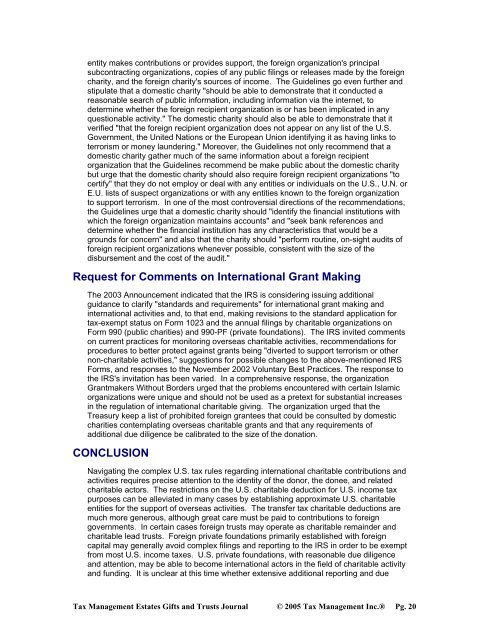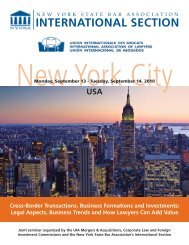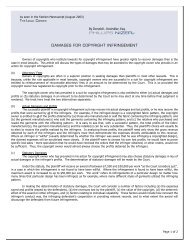International Charitable Giving And Planning ... - Phillips Nizer LLP
International Charitable Giving And Planning ... - Phillips Nizer LLP
International Charitable Giving And Planning ... - Phillips Nizer LLP
Create successful ePaper yourself
Turn your PDF publications into a flip-book with our unique Google optimized e-Paper software.
entity makes contributions or provides support, the foreign organization's principalsubcontracting organizations, copies of any public filings or releases made by the foreigncharity, and the foreign charity's sources of income. The Guidelines go even further andstipulate that a domestic charity "should be able to demonstrate that it conducted areasonable search of public information, including information via the internet, todetermine whether the foreign recipient organization is or has been implicated in anyquestionable activity." The domestic charity should also be able to demonstrate that itverified "that the foreign recipient organization does not appear on any list of the U.S.Government, the United Nations or the European Union identifying it as having links toterrorism or money laundering." Moreover, the Guidelines not only recommend that adomestic charity gather much of the same information about a foreign recipientorganization that the Guidelines recommend be make public about the domestic charitybut urge that the domestic charity should also require foreign recipient organizations "tocertify" that they do not employ or deal with any entities or individuals on the U.S., U.N. orE.U. lists of suspect organizations or with any entities known to the foreign organizationto support terrorism. In one of the most controversial directions of the recommendations,the Guidelines urge that a domestic charity should "identify the financial institutions withwhich the foreign organization maintains accounts" and "seek bank references anddetermine whether the financial institution has any characteristics that would be agrounds for concern" and also that the charity should "perform routine, on-sight audits offoreign recipient organizations whenever possible, consistent with the size of thedisbursement and the cost of the audit."Request for Comments on <strong>International</strong> Grant MakingThe 2003 Announcement indicated that the IRS is considering issuing additionalguidance to clarify "standards and requirements" for international grant making andinternational activities and, to that end, making revisions to the standard application fortax-exempt status on Form 1023 and the annual filings by charitable organizations onForm 990 (public charities) and 990-PF (private foundations). The IRS invited commentson current practices for monitoring overseas charitable activities, recommendations forprocedures to better protect against grants being "diverted to support terrorism or othernon-charitable activities," suggestions for possible changes to the above-mentioned IRSForms, and responses to the November 2002 Voluntary Best Practices. The response tothe IRS's invitation has been varied. In a comprehensive response, the organizationGrantmakers Without Borders urged that the problems encountered with certain Islamicorganizations were unique and should not be used as a pretext for substantial increasesin the regulation of international charitable giving. The organization urged that theTreasury keep a list of prohibited foreign grantees that could be consulted by domesticcharities contemplating overseas charitable grants and that any requirements ofadditional due diligence be calibrated to the size of the donation.CONCLUSIONNavigating the complex U.S. tax rules regarding international charitable contributions andactivities requires precise attention to the identity of the donor, the donee, and relatedcharitable actors. The restrictions on the U.S. charitable deduction for U.S. income taxpurposes can be alleviated in many cases by establishing approximate U.S. charitableentities for the support of overseas activities. The transfer tax charitable deductions aremuch more generous, although great care must be paid to contributions to foreigngovernments. In certain cases foreign trusts may operate as charitable remainder andcharitable lead trusts. Foreign private foundations primarily established with foreigncapital may generally avoid complex filings and reporting to the IRS in order to be exemptfrom most U.S. income taxes. U.S. private foundations, with reasonable due diligenceand attention, may be able to become international actors in the field of charitable activityand funding. It is unclear at this time whether extensive additional reporting and dueTax Management Estates Gifts and Trusts Journal © 2005 Tax Management Inc.® Pg. 20




